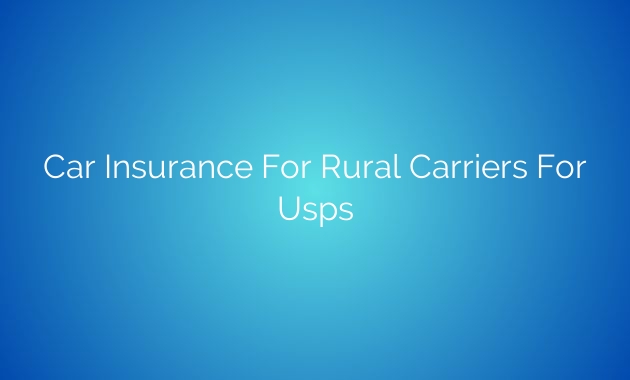Contents
- 1 Car Insurance For Rural Carriers For USPS
- 1.1 Introduction
- 1.2 The Importance of Car Insurance for Rural Carriers
- 1.3 Types of Car Insurance Coverage
- 1.4 Tips for Finding the Best Car Insurance
- 1.5 Conclusion
- 1.6 Frequently Asked Questions (FAQs)
- 1.6.1 1. Is car insurance mandatory for rural carriers?
- 1.6.2 2. Can I use my personal car insurance for USPS deliveries?
- 1.6.3 3. How can I lower my car insurance premium?
- 1.6.4 4. What should I do if I am involved in an accident as a rural carrier?
- 1.6.5 5. Can I change my car insurance coverage as my needs evolve?
Car Insurance For Rural Carriers For USPS
Introduction
Car insurance is an essential requirement for every vehicle owner, including rural carriers for the United States Postal Service (USPS). As a rural carrier, you navigate through various terrains and weather conditions, making car insurance crucial to protect yourself, your vehicle, and the valuable mail you deliver. In this article, we will delve into the importance of car insurance for rural carriers, the coverage options available, and tips for finding the best insurance plan to meet your specific needs.
The Importance of Car Insurance for Rural Carriers
Car insurance provides financial protection in the event of an accident, theft, or damage to your vehicle. As a rural carrier, you may encounter unique risks and challenges on the road, such as driving on unpaved or poorly maintained roads, encountering wildlife, or facing adverse weather conditions. Having comprehensive car insurance can help mitigate these risks and provide peace of mind while performing your duties.
Furthermore, car insurance is not only essential for your vehicle but also safeguards your personal and professional life. Accidents can lead to medical expenses, lawsuits, and potential loss of income. With the right insurance coverage, you can protect yourself from these potential financial burdens.
Types of Car Insurance Coverage
1. Liability Insurance:
Liability insurance is a mandatory coverage for all vehicle owners, including rural carriers. It protects you if you cause an accident resulting in injury or property damage to others. This coverage helps pay for medical bills, legal fees, and property repairs or replacements.
2. Collision Coverage:

Collision coverage pays for the repairs or replacement of your vehicle in case of an accident, regardless of fault. This coverage is particularly crucial for rural carriers who often face unpredictable driving conditions.
3. Comprehensive Coverage:
Comprehensive coverage offers protection against non-accident-related incidents, such as theft, vandalism, natural disasters, or damage from falling objects. As a rural carrier, this coverage can be invaluable, especially when delivering mail in remote areas.
4. Personal Injury Protection (PIP):
PIP coverage provides medical expense coverage for you and your passengers in case of an accident. It helps cover medical bills, lost wages, and other related expenses, regardless of fault. This coverage is particularly important for rural carriers who spend long hours on the road.
Tips for Finding the Best Car Insurance
1. Assess Your Needs:
Before purchasing car insurance, evaluate your specific needs as a rural carrier. Consider factors such as the type of vehicle you drive, the areas you deliver to, and the amount of coverage required to provide adequate protection.
2. Compare Quotes:
Obtain quotes from multiple insurance providers to compare coverage options and prices. Look for insurers that specialize in car insurance for rural carriers or offer specific policies tailored to your unique needs.
3. Research the Insurer:
Ensure the insurer you choose has a strong reputation, reliable customer service, and a good claims process. Read reviews and seek recommendations from other rural carriers or USPS colleagues.
4. Consider Deductibles and Limits:
Review the deductibles and coverage limits of different insurance plans. Higher deductibles can lower your premium, but ensure you can afford to pay the deductible if you need to make a claim.
5. Take Advantage of Discounts:
Inquire about available discounts, such as safe driving discounts, multi-policy discounts, or discounts for USPS employees. These can help reduce your premium while maintaining adequate coverage.
Conclusion
Car insurance for rural carriers is vital for protecting yourself, your vehicle, and the valuable mail you deliver. By understanding the different types of coverage available and following the tips provided, you can find the best car insurance plan to suit your specific needs and ensure that you are adequately protected on the road.
Frequently Asked Questions (FAQs)
1. Is car insurance mandatory for rural carriers?
Yes, car insurance is mandatory for all vehicle owners, including rural carriers. It is essential to comply with legal requirements and protect yourself from financial risks.
2. Can I use my personal car insurance for USPS deliveries?
Using personal car insurance for USPS deliveries may not provide adequate coverage for work-related incidents. It is recommended to consider insurance plans specifically designed for rural carriers or seek additional coverage options.
You can lower your car insurance premium by maintaining a good driving record, bundling policies, taking advantage of available discounts, and increasing deductibles. Additionally, shopping around and comparing quotes from different insurers can help you find the most affordable option.
4. What should I do if I am involved in an accident as a rural carrier?
If you are involved in an accident, prioritize your safety and the safety of others involved. Contact the necessary authorities, gather information from the other party, and notify your insurance provider as soon as possible to initiate the claims process.
5. Can I change my car insurance coverage as my needs evolve?
Yes, you can adjust your car insurance coverage as your needs change. Review your policy periodically, especially when there are significant changes in your driving habits, vehicle condition, or job requirements, and make the necessary adjustments to ensure you have adequate coverage.
